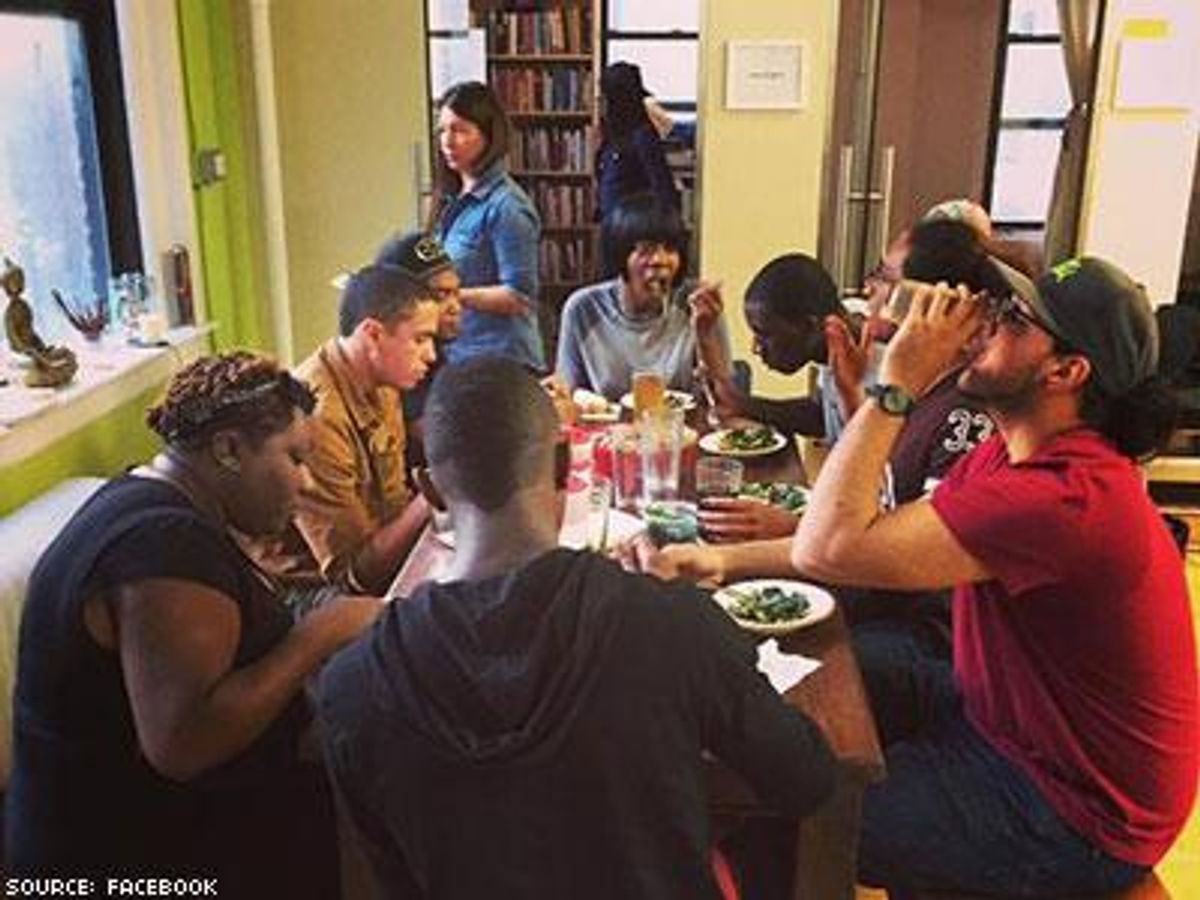In 2011, Derrick Cobb went on his first Reciprocity retreat. The agency had already transformed life for Cobb, who at age 17 had been kicked out of his mother and stepfather's home (with his stepfather's disapproval of Cobb's being gay apparently playing a part in tension at home). Cobb had sought help at a New York City youth shelter that connected him to Reciprocity, which then connected him with mentors who helped him find his way doing professional modeling and dancing.
It had been "like a fairy tale, almost," says Cobb, now 24. But the ministrations of proverbial professional godmothers and godfathers notwithstanding, confirmed "city kid" Cobb was skeptical about a weekend away, in technological isolation -- especially given the lack of TV and Internet service at the upstate Buddhist center where the retreat took place. He chugged down his soda on the way because no outside food could come in with him.
Cobb had told his boss at the coffee shop where he worked that he was going away on a family vacation, which in a way was true. Reciprocity had become like Cobb's family. But there was more to it than escaping the daily grind and enjoying one another's company. This retreat was about self-examination and spiritual growth.
"Soul-searching started happening," says Cobb, who had the revelation that "I have some deep shit that I'm not focusing on."
At shelters, he says, there is a lot of focus on tangible problems: I need money. I need a job. I need a place to sleep. Urgent concerns, to be sure, but on retreat Cobb found himself going deeper and stopping to think, Wow, I'm hurt. I need help.
During the retreat, he worked on feeling gratitude for the things he had. He prayed; he meditated; he did yoga. One morning, he did yoga with Reciprocity cofounder Taz Tagore and broke down crying in her arms.
"A yoga class is just a yoga class," Tagore says, unless you're connecting it to what's holding you back in life. And that's exactly what she wants homeless youth to do: to "put the inner first," heal from the often devastating wounds of the past and grapple with difficult questions: Where do I belong? Do I have value? Is there a purpose to the suffering I've experienced?
She says she wants young people to find their purpose in the world. Without such work, she says, too many youth find jobs and housing only to find that they can't sustain their new life because they are afraid, angry, and traumatized in ways that may not be readily apparent. It might seem that they just need a break and then "the rest is going to fall into place," but Reciprocity, she says, helps them understand that the journey requires inner work.
Tagore, a Buddhist, founded Reciprocity with friend Adam Bucko, a mystic Christian. Tagore's family fled from east Africa during an "ethnic cleansing," Bucko's from communist Poland. When they connect to a homeless person, Tagore says, they are "really seeing ourselves in them ... so the work for us has always been a very spiritual journey."
Reciprocity isn't exclusive to LGBT youth, but a majority of its clients are LGBT -- and many of them have experienced religiously based rejection. That can add another layer to the healing process; it can also mean they've already done a lot of inner work as they've come to terms with their identities, Tagore says. Sometimes they're caught in "a strange paradox" in which they see the structure of religions as divisive but feel spiritually awake. Tagore says that makes LGBT youth "very ripe for the work that we do with them," which involves giving them a chance to explore spirituality in a positive way.
Retreats might include vision quests, prayers and other practices. Tagore and Bucko incorporate practices that are meaningful for them, not to force youth to follow their lead but to help them connect to spirituality and perhaps adopt their own practice.
That's what happened for Cobb.
"It was a healthy way for me to reconnect with religion and with spiritual practices," he says. The retreat, he says, helped him reconnect with his identity as a gay man and with his spirituality as a man.
After the retreat, he maintained his commitment to movement and physical wellness. And he continued to practice compassion for those less fortunate -- even losing a job because he insisted on giving leftover food to a shelter instead of letting it be discarded.
Now Cobb works out more. He has his own apartment. And he makes a living dancing and modeling. He loves focusing on his talents and dreams full-time.
And last fall he attended another Reciprocity retreat -- this time as a staff member. He taught yoga and hip-hop classes to encourage habits that support health and wellness.
Reciprocity holds a few retreats each year, not all in the same location. The fall 2014 retreat took place at a holistic center. Unlike the Buddhist center where Cobb previously attended a retreat, there was functional technology available. But nevertheless, Cobb decided to turn his phone off and take the opportunity to focus.



















































































